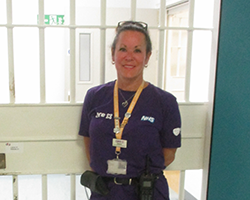Prison nurse Deanna Mezen guarantees continuity of care for detainees

Deanna Mezen
"My priority is to ensure continuity of care for our patients. This means meeting their health needs by ensuring they receive the care they need in a timely manner, and working alongside colleagues from different disciplines,” explains nurse Deanna Mezen, who works in Staffordshire, at one of the largest prisons in the United Kingdom.
"As a nurse with prescription rights, I have been trained to assess, manage and prescribe various drugs related to residents’ physical well-being. These medications may, for example, address cardiac conditions, asthma, diabetes and epilepsy. Not being limited to access a prescription from a general practitioner and being able to have it renewed by a trained professional who spends more time on the premises means that individuals are more likely to access their medication when they need it.
"I work closely with medical doctors and nurses specializing in various fields, such as substance misuse and other mental health issues. As a team, we discuss each patient and the best possible course of treatment for them but also with them.
"We strive to deliver a holistic care approach that is patient-centred, taking into account various aspects of a person's health. Interventions may call for health promotion activities, referrals to pain management specialists, physical activity or dietary advice.
"In addition to prescribing and dispensing medication, various professional development courses equipped me with the skills to manage complex cases, such as cancer patients or those with multiple morbidities.
"I am grateful to have had my employer’s support in attending various professional development courses and in my enrolment in a master's degree in advanced practice nursing," says the 52-year-old nurse, who began working in prisons over a decade ago.
Meeting the residents’ varied needs
“The health needs of our residents are varied. They include palliative care needs, transgender health needs for those wanting to transition from male to female, or care for veterans suffering from post-traumatic stress disorder. To ensure the best possible care to all, we often work closely with charities and organizations outside of the custodial setting.
“Perhaps what I am most proud of is our Dying Well in Custody programme, by which we ensure that residents who have requested to die in the custodial setting can do so with dignity.
“I believe everyone deserves the best care possible, no matter where they come from or what they have done.
“This willingness to show compassion is at the core of nursing practice, a quality that everyone working in health in justice systems must have. I personally feel privileged to be able to look after people who may not have been cared for before.”
COVID-19 provided the opportunity to implement new tools and practices
“During the current COVID-19 pandemic, we have followed national public health measures and WHO technical guidance in the implementation of infection prevention measures in the prison setting.
“To keep all residents informed, we have made available throughout the facility a number of interactive kiosks that provide information about physical distancing measures, symptoms, respiratory etiquette, hand hygiene, and available services, such as mental health support.
“As soon as somebody develops COVID-19 symptoms, we relocate both the symptomatic resident and his cellmate to single rooms in a separate facility, where they remain isolated. Immediately after a new case is identified, contact tracing procedures are implemented to prevent the spread of the virus.
“To guarantee continuity of care despite the inability to leave the prison, we have set up telemedicine tools, whereby people can receive specialist medical support via video consultations. We have set up a two-way phone line with each cell, which we use to check on everyone’s well-being and to be alerted if needed.
“These new technological tools are something we will keep in place even after the pandemic has ended, as they have been a great asset in offering the highest-quality care to our residents.”



